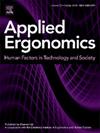Identifying smart technology and artificial intelligence solutions for human factors and ergonomic challenges in all-hazard response: A survey study
IF 3.1
2区 工程技术
Q2 ENGINEERING, INDUSTRIAL
引用次数: 0
Abstract
Emergency responders face significant human factors and ergonomic (HF/E) challenges related to physical, cognitive, emotional, and training demands during high-stress situations. This study investigates these issues through a survey of 60 emergency responders, identifying key HF/E concerns such as fatigue, cognitive overload, and emotional stress. The research proposes innovative artificial intelligence and smart technology-driven solutions, including personalized protective equipment with exoskeleton, augmented reality tools for situational awareness, and virtual reality-based training simulations, to address these challenges. With statistical analysis results, the study emphasizes integrative approach via enhancing responder safety, efficiency, and mental well-being. The findings provide high priority HF/E solutions for advancing adaptive technologies and improving all-hazard responses, ultimately benefiting both responders and the communities they serve.
确定智能技术和人工智能解决方案,以应对所有危害响应中的人为因素和人体工程学挑战:一项调查研究
在高压力环境下,应急响应人员面临着与身体、认知、情感和训练需求相关的重大人为因素和人体工程学(HF/E)挑战。本研究通过对60名急救人员的调查来调查这些问题,确定了HF/E的关键问题,如疲劳、认知超载和情绪压力。该研究提出了创新的人工智能和智能技术驱动的解决方案,包括带有外骨骼的个性化防护设备、用于态势感知的增强现实工具和基于虚拟现实的训练模拟,以应对这些挑战。通过统计分析结果,该研究强调通过提高响应者的安全、效率和心理健康的综合方法。研究结果为推进自适应技术和改善全灾害响应提供了高优先级的高频/电子解决方案,最终使响应者和他们所服务的社区受益。
本文章由计算机程序翻译,如有差异,请以英文原文为准。
求助全文
约1分钟内获得全文
求助全文
来源期刊

Applied Ergonomics
工程技术-工程:工业
CiteScore
7.50
自引率
9.40%
发文量
248
审稿时长
53 days
期刊介绍:
Applied Ergonomics is aimed at ergonomists and all those interested in applying ergonomics/human factors in the design, planning and management of technical and social systems at work or leisure. Readership is truly international with subscribers in over 50 countries. Professionals for whom Applied Ergonomics is of interest include: ergonomists, designers, industrial engineers, health and safety specialists, systems engineers, design engineers, organizational psychologists, occupational health specialists and human-computer interaction specialists.
 求助内容:
求助内容: 应助结果提醒方式:
应助结果提醒方式:


